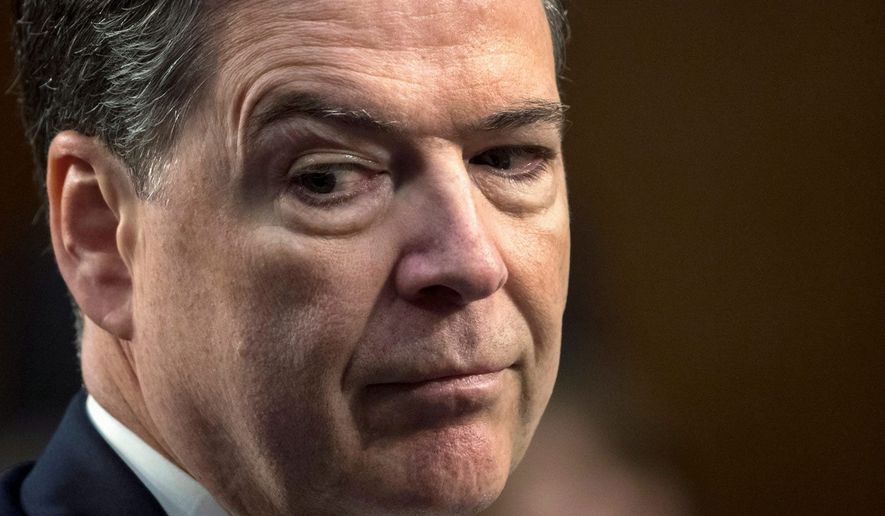One of the stories for which the New York Times won a coveted George Polk Award was a Russia-Trump report that was repudiated by former FBI Director James Comey.
The Times won the award on Feb. 20 for 12 stories it submitted on Donald Trump and his associates ties to Russia, according to a list provided by Polk to The Washington Times.
One of them was a Feb. 14, 2017 story headlined, “Trump Campaign Aides Had Repeated Contacts with Russian Intelligence.”
Written by Michael S. Schmidt, Mark Mazzetti and Matt Apuzzo, the lead said:
“Phone records and intercepted calls show that members of Donald J. Trump’s 2016 presidential campaign and other Trump associates had repeated contacts with senior Russian intelligence officials in the year before the election, according to four current and former American officials.”
In essence, the story asserted that Trump people colluded with Russian intelligence, which hacked Democrat Party computers in 2015-16.
The story, plus the infamous Christopher Steele dossier, played major roles in pushing the Trump-Russian collusion narrative in Washington as committees ramped up investigations.
More than a year later, Republicans contend there was no collusion.
Four months after the Times story appeared, at a hearing before the Senate Select Committee on Intelligence, Sen. Tom Cotton, Arkansas Republican, had this exchange with then-former director Comey:
COTTON: On February 14th, the New York Times published a story, the headline of which was, “Trump Campaign Aides Had Repeated Contacts With Russian Intelligence.”
You were asked earlier if that was an inaccurate story, and you said, in the main. Would it be fair to characterize that story as almost entirely wrong?
COMEY: Yes.
Also, questioned by Sen. James Risch, Idaho Republican, Mr. Comey said he was so alarmed by the story he first checked with the intelligence community to see if he had missed something. Finding out he had not, he notified congressional leaders to discard the report.
RISCH: In addition to that, after that, you sought out both Republican and Democrat senators to tell them that, hey, I don’t know where this is coming from, but this is not the — this is not factual. Do you recall that?
COMEY: Yes.
RISCH: OK. So — so, again, so the American people can understand this, that report by the New York Times was not true. Is that a fair statement?
COMEY: In — in the main, it was not true. And, again, all of you know this, maybe the American people don’t. The challenge — and I’m not picking on reporters about writing stories about classified information, is that people talking about it often don’t really know what’s going on.
The New York Times public affairs office did not immediately return a message.
Headquartered at Long Island University, a Polk award is one of the most coveted in journalism. Awards for Trump Russia coverage in 2017 went to the Washington Post as well as the Times.
The citation said in part, “Special recognition goes out this year to the staffs of The New York Times and The Washington Post for their extraordinary effort in uncovering the connection between the Trump presidential campaign and the Kremlin that led to Special Counsel Robert Mueller’s ongoing investigation. The Polk judges felt the investigative work, based on the cultivation of sources, was equally outstanding on the part of both newspapers and may play a significant role in safeguarding our democracy from foreign interference.”
While Mr. Comey debunked the Feb. 14 story, The Times did not back off it.
The Times won for 12 stories in all. They included its exclusive on Mr. Comey’s private memos he wrote for the record after one-on-one meetings with President Trump. The Times also broke the story that the FBI opened a counter-intelligence investigation in July 2016 after receiving a report from a diplomat about Trump volunteer George Papadopoulos. The volunteer said he heard from a Kremlin-linked professor that Moscow owned “thousands” of Hillary Clinton emails.
Wikileaks released stolen Democrat Party emails that month that the U.S. says came from Russian hacking. The hack is part of the ongoing special counsel investigation into Russia election interference and if Trump people helped.
The FBI placed a wiretap on onetime Trump volunteer Carter Page on Oct. 21, 2016 that would last nearly a year. Mr. Page, a former Moscow resident, had traveled to the city in July to deliver a public speech at a university.
The dossier said he met with two Kremlin operatives and discussed bribes. Under oath, Mr. Page has repeatedly denied he ever met the men and says he will not be charged with wrongdoing.
When Mr. Comey testified in June, the FBI was obtaining its last 90-day surveillance warrant on Mr. Page.
The FBI has not confirmed the dossier’s major charges, but continues to investigate.
The dossier, written by ex-British spy Steele and financed by Democrats, said there was an “extensive conspiracy” between the Trump campaign and the Kremlin.
The dossier was posted by BuzzFeed on Jan. 10, a month before the New York Times story which basically made the same charge.
• Rowan Scarborough can be reached at rscarborough@washingtontimes.com.




Please read our comment policy before commenting.